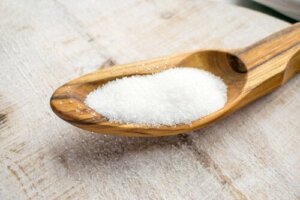Is Erythritol Harmful to Health?


Written and verified by the doctor Elisa Martin Cano
Erythritol is a sweetener that has become popular on the market in recent years. It’s found in many of the low-calorie or sugar-free products that some people include in their regular diets.
Although it has been presented as an alternative to traditional table sugar, not everything is good about this substance. So, what are its disadvantages? In today’s article, we’ll take a closer look.
What is erythritol?
Erythritol is a sugar alcohol. It’s a natural sweetener obtained from the fermentation of sugars. What happens with this sweetener is that its absorption is slow, as well as the insulin response it activates.
Therefore, it’s a product that causes blood glucose levels to increase gradually or not change at all without producing a high peak. The body’s response to the sweetener makes it suitable, for example, for diabetic patients.
People with this condition have problems when processing glucose in the blood, so products that increase the amount of glucose in a controlled and scarce way are the most suitable for them. In addition, studies show that erythritol does not alter insulin and is practically as sweet as table sugar.

Where can erythritol be found?
As we’ve already mentioned, there are many products on the market that contain this sweetener. Some of the most common are, for example:
- Sugar-free chewing gum
- Sugar-free or diabetic foods
- Foods that are marketed as light
In addition, it can also be found in some foods naturally, such as fermented soy, wine, or certain mushrooms. It’s also produced by some fruits such as watermelon or pears. Therefore, it’s very common to consume this substance.
Like this article? You may also like to read: White, Brown, and Muscovado Sugar: Similarities and Differences
What are its benefits and disadvantages?
We’ve already seen that the use of erythritol leads to certain advantages. Some of them are the fact that diabetics can consume it, and that it’s a good option for people who are trying to lose weight. The substance contains less than 0.2 kilocalories per gram, so it’s ideal for sweetening without gaining any extra weight.
However, not everything is beneficial when it comes to this sweetener. As with other similar products, the key is to only consume it in moderation. In fact, in some cases, it can cause side effects. We’ll tell you more about them below.
1. Erythritol side effects; Gas and bloating
The most common side effects of fermented sugars include gas, discomfort, and abdominal bloating. This occurs because sugar alcohols, being fermented products, cannot be broken down normally by the digestive enzymes present in the stomach.
However, microorganisms in the intestine are able to break down fermented sugars such as erythritol into simpler sugars, which are the ones that will be absorbed. This, therefore, leads to an increase in the number of microorganisms present in the digestive system.
In people with stable microbiota and no health problems, the consumption of these products can be beneficial in keeping their gut microorganisms in balance. However, erythritol will not only increase the amount of “good” microorganisms in the gut.
If the person has an imbalance in his or her microbiota, the number of pathological bacteria and microorganisms will also increase. Consequently, when degrading erythritol, these microorganisms can cause gas, abdominal bloating, and discomfort.
Therefore, in people affected by irritable bowel syndrome, Crohn’s disease, and gastritis, among other intestinal diseases, consuming a lot of this substance isn’t recommended. The symptoms in them will be more severe.

We think you may be interested in reading this, too: How to Lower Blood Sugar Levels During an Emergency
2. Erythritol and weight loss
We’ve already highlighted the use of this sweetener in light or low-sugar products, which many people consume in diets or to lose weight on their own. However, is it really all that effective?
When we consume table sugar or other caloric sugars, the body activates a series of processes. Among others, when it detects the consumption of calories, it activates the production of certain hormones with a satiating effect. In the case of erythritol, however, this isn’t the case.
The body doesn’t process erythritol as it would ordinary sugar. This means that these satiety hormones are not released. For this reason, when eating many foods containing this substance, people often become dissatisfied and tend to feel hungrier than normal.
In other words, the need to “snack” between meals increases, and, therefore, the effect is contrary to weight loss. Even if they are “light” products, their excessive intake is detrimental in terms of body weight.
3. Diarrhea
The intake of high concentrations of erythritol can cause diarrhea as part of its adverse effects. In fact, a publication in the European Journal of Clinical Nutrition showed that ingestion of 20 to 25 grams of the compound generates this symptom in young children.
In addition, diarrhea may be accompanied by severe gastrointestinal symptoms and generate a laxative effect. In this sense, cautious use of erythritol is always recommended.
Erythritol as a sweetener: What to remember
Among the sweeteners used as a substitute for table sugar, erythritol is one of the most advisable. Although it’s a fermented sugar, the side effects it produces in the digestive system are less than those caused by other similar sweeteners. In addition, its low glycemic index is an advantage for people suffering from diabetes.
Finally, we must remember that weight loss should always be done responsibly and, as far as possible, supervised by a specialist. Do not abuse light or low-sugar products that can lead to other side effects, such as unintentional weight gain.
All cited sources were thoroughly reviewed by our team to ensure their quality, reliability, currency, and validity. The bibliography of this article was considered reliable and of academic or scientific accuracy.
- Escobedo Brevis AA. Evaluación de la fermentación de los distintos tipos de endulzantes utilizados en la dieta por lactobacillus ssp. Universidad Andrés Bello (Chile); 2015.
- Herrero Carrasco J, de Villalonga Smith. (2016). Efectos de la utilización de Stevia en la dieta sobre la población diabética. Universitat de les Illes Balears
- Ruiz-Ojeda FJ, Plaza-Díaz J, Sáez-Lara MJ, Gil A. Effects of Sweeteners on the Gut Microbiota: A Review of Experimental Studies and Clinical Trials [published correction appears in Adv Nutr. 2020 Mar 1;11(2):468]. Adv Nutr. 2019;10(suppl_1):S31‐S48. doi:10.1093/advances/nmy037
- Hootman KC, Trezzi JP, Kraemer L, et al. Erythritol is a pentose-phosphate pathway metabolite and associated with adiposity gain in young adults. Proc Natl Acad Sci U S A. 2017;114(21):E4233‐E4240. doi:10.1073/pnas.1620079114
- Quintanilla, Rosa. (2018). Determinación del consumo de edulcorantes, estado nutricional y estilos de vida en diabéticos del centro de salud centro histórico Nº1 de la ciudad de Quito, 2017. Disponible en: http://repositorio.utn.edu.ec/handle/123456789/7866
- K. Regnat, R. L. Mach, & A. R. Mach. (2018). Erythritol as sweetener—wherefrom and whereto? Appl Microbiol Biotechnol. Disponible en: https://www.ncbi.nlm.nih.gov/pmc/articles/PMC5756564/
- E Jacqz-Aigrain, Et al. (2015). Gastrointestinal tolerance of erythritol-containing beverage in young children: a double-blind, randomised controlled trial. DOI: 10.1038/ejcn.2015.4
This text is provided for informational purposes only and does not replace consultation with a professional. If in doubt, consult your specialist.








